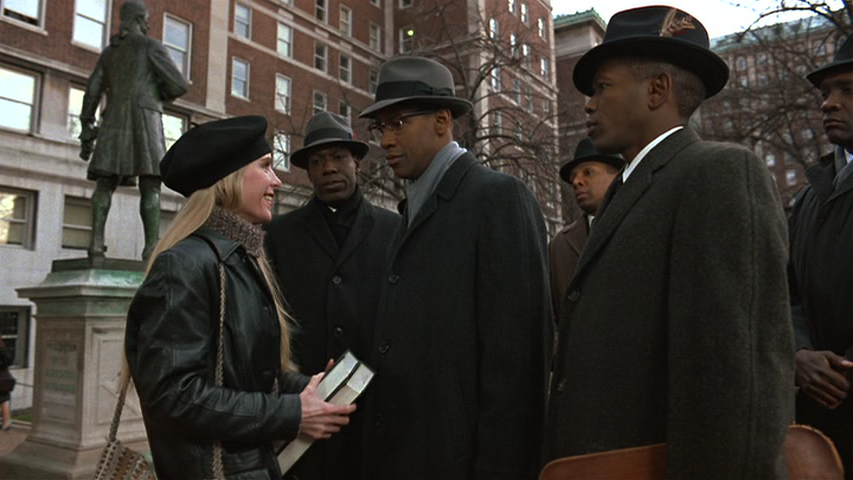3 1/2 hours?!?

Dude, it's the first week of the playoffs!

Naw, just kidding…I cleared time for
Malcolm X and was glad to do it. I saw it once back in the day but this is a movie that's still relevant, particularly for a generation that considered
Black Panther to be some kind of history-making breakthrough. 27 years ago there was a big budget epic Hollywood mainstream film about a real black hero building a real black nation.
Black Panther in comparison does not seem like progress to me. What am I missing?
The first half of
Malcolm X focuses on his early years prior to his conversion to Islam when he was known as Red, a street hustler. It's a series of episodes which are like mini-genre films themselves. Musical romance first, with a song and dance number clearly choreographed for the camera climaxing with Spike himself sliding across the floor to grab a closeup. Then a kind of neo-western, with Red strolling into a Harlem bar like a stranger in a western town walking into a saloon and being confronted by a local tough. Then it's a heist movie, then a prison drama where he discovers Islam, whereupon the film settles into the biopic of the radical preacher that we would know as a public figure. From then on it's a path to enlightenment as Malcolm continues to develop his understanding of his new worldview while preaching it to his followers at the same time. It's a fluid situation, he makes mistakes along the way. The spiritual and political and the public and private are not easily separated. By the end the antagonisms he must navigate come not so much from White America but from the demands of his home and family life on one hand and the internal politics of his religious organization, the Nation of Islam, on the other.
Women. Islam's relationship with feminism is problematic and the irony of an organization dedicated to freeing members from the slave mentality on one hand while declaring women to be their property on the other is noted. Accordingly Malcolm's own relationships with women mirror this: Red's relationship with his white girlfriend seems to be his most genuine and caring relationship. As a Muslim, his relationship with his wife seems cold and distant by comparison...he proposes over the phone. His children just suddenly appear on the scene. They argue like any married couple, which works if the intention is to make him look like a normal guy. But he seems too committed spiritually and politically to be romantic, he's anything but a normal guy.
Church.
Malcolm X is a kind of cautionary tale about the relationship between religious and political movements. "God's word is no hustle." Maybe, but beware the words of those who claim to speak on God's behalf. Hand-picked and groomed to be the voice of the Nation of Islam, Malcolm becomes too good at his job, too powerful for the comfort of other church ministers, and had to be eliminated. White America may have breathed easier at the time, but they may have lost their own Mandela, a leader who may have led them out of the hole they had dug for themselves.
There have been umpteen hundred American movies made about race relations, most offering the same humanist solutions.
Malcom X is one of the few that really recognizes how deeply woven into the social fabric is this poisonous thread, the legacy of slavery. It's practically a defining aspect of the American condition. Why can't we all just get along?
Malcolm X has some answers for that rhetorical question.






 Dude, it's the first week of the playoffs!
Dude, it's the first week of the playoffs!